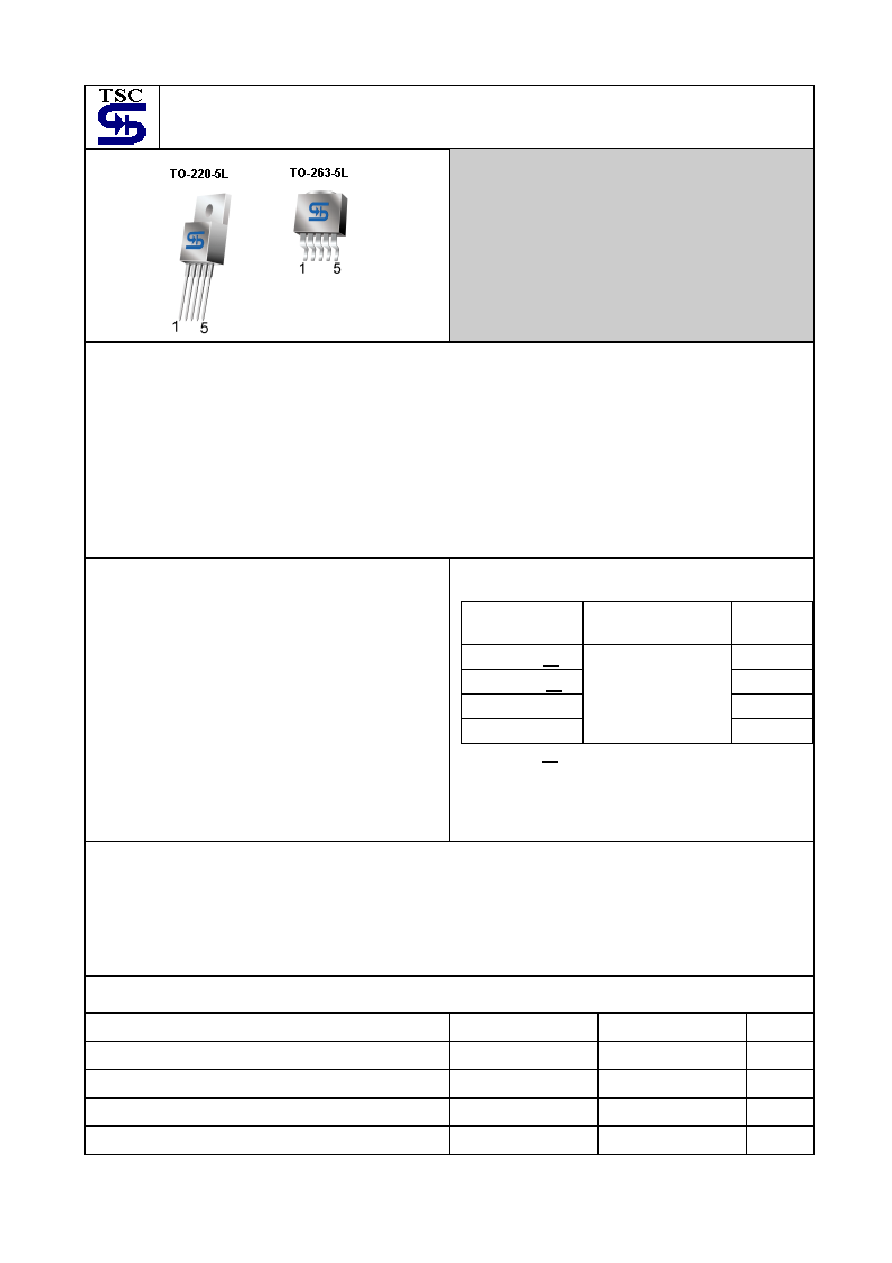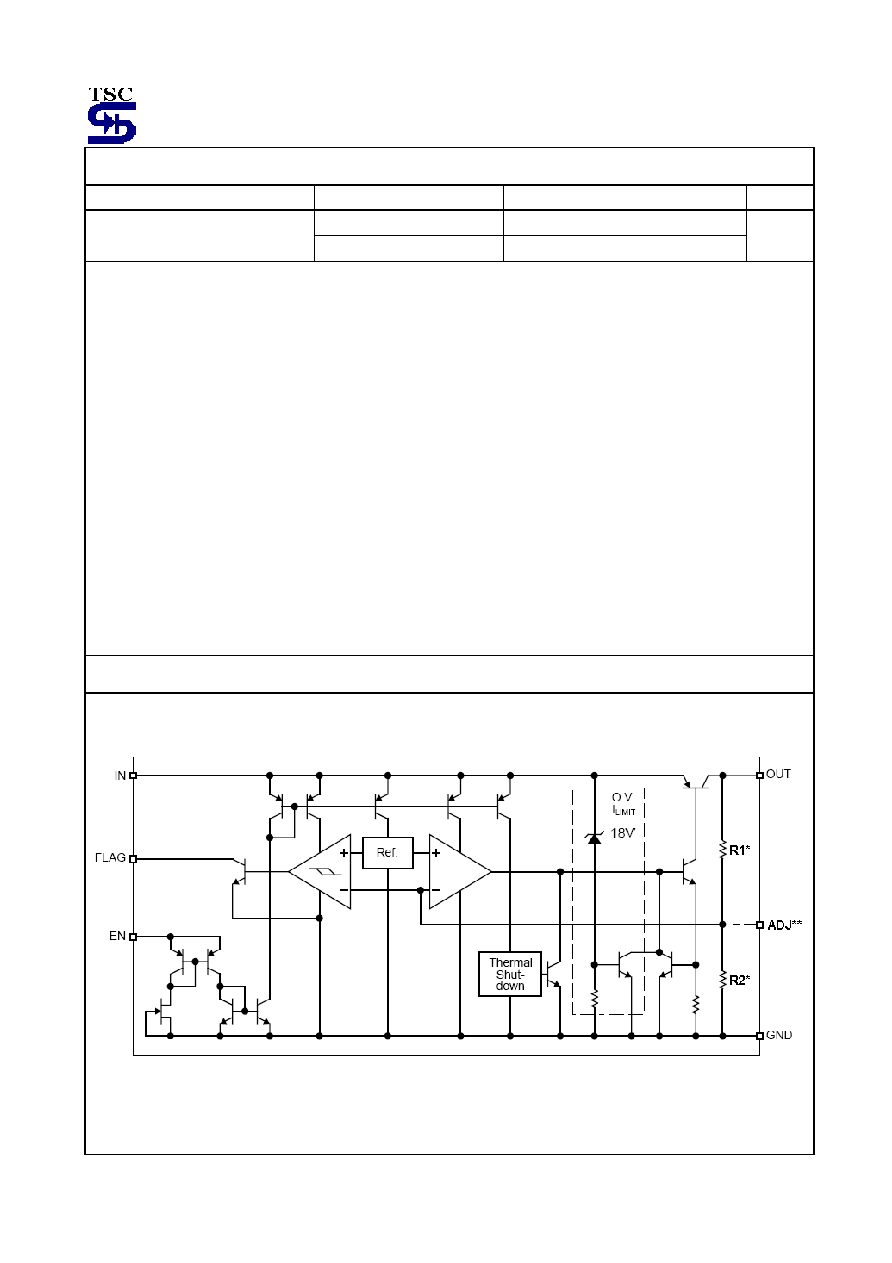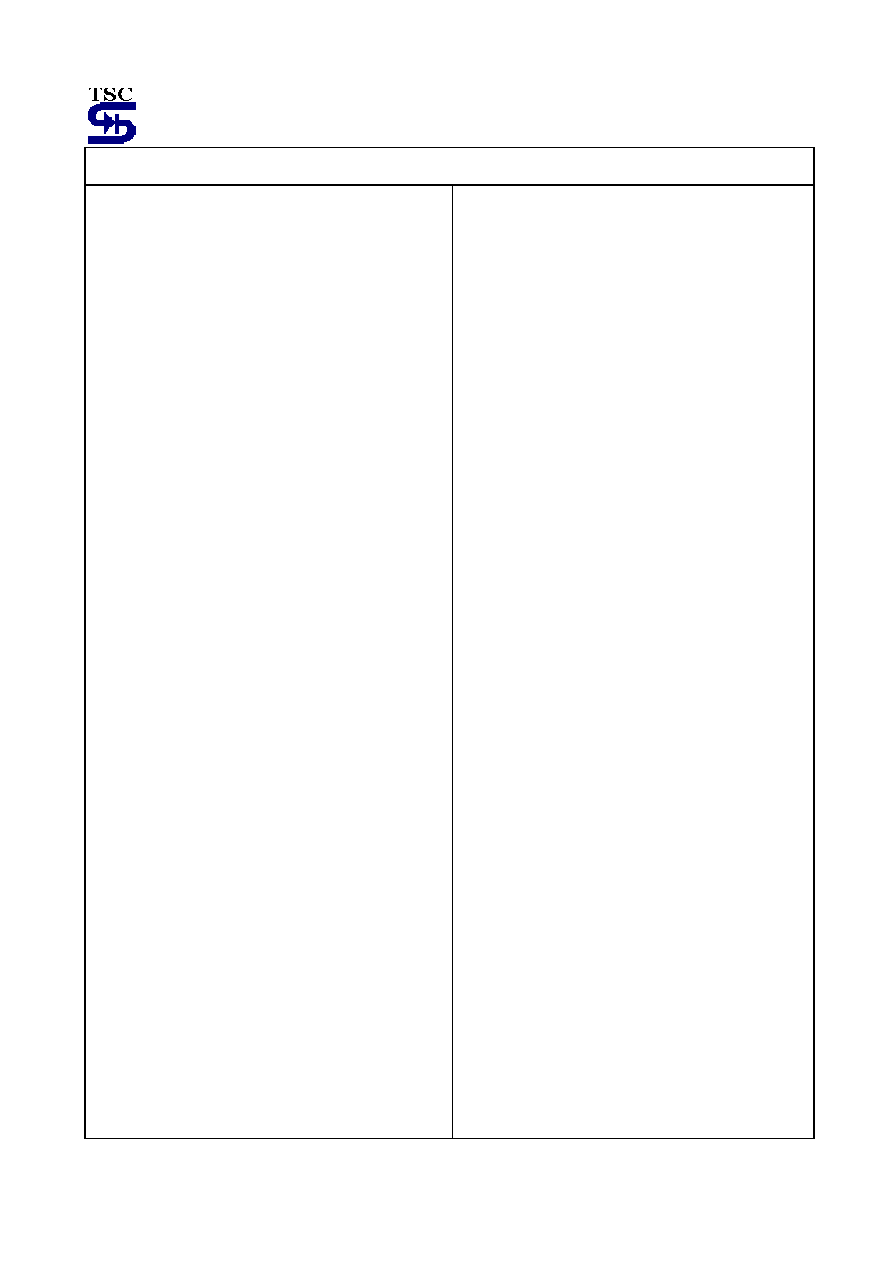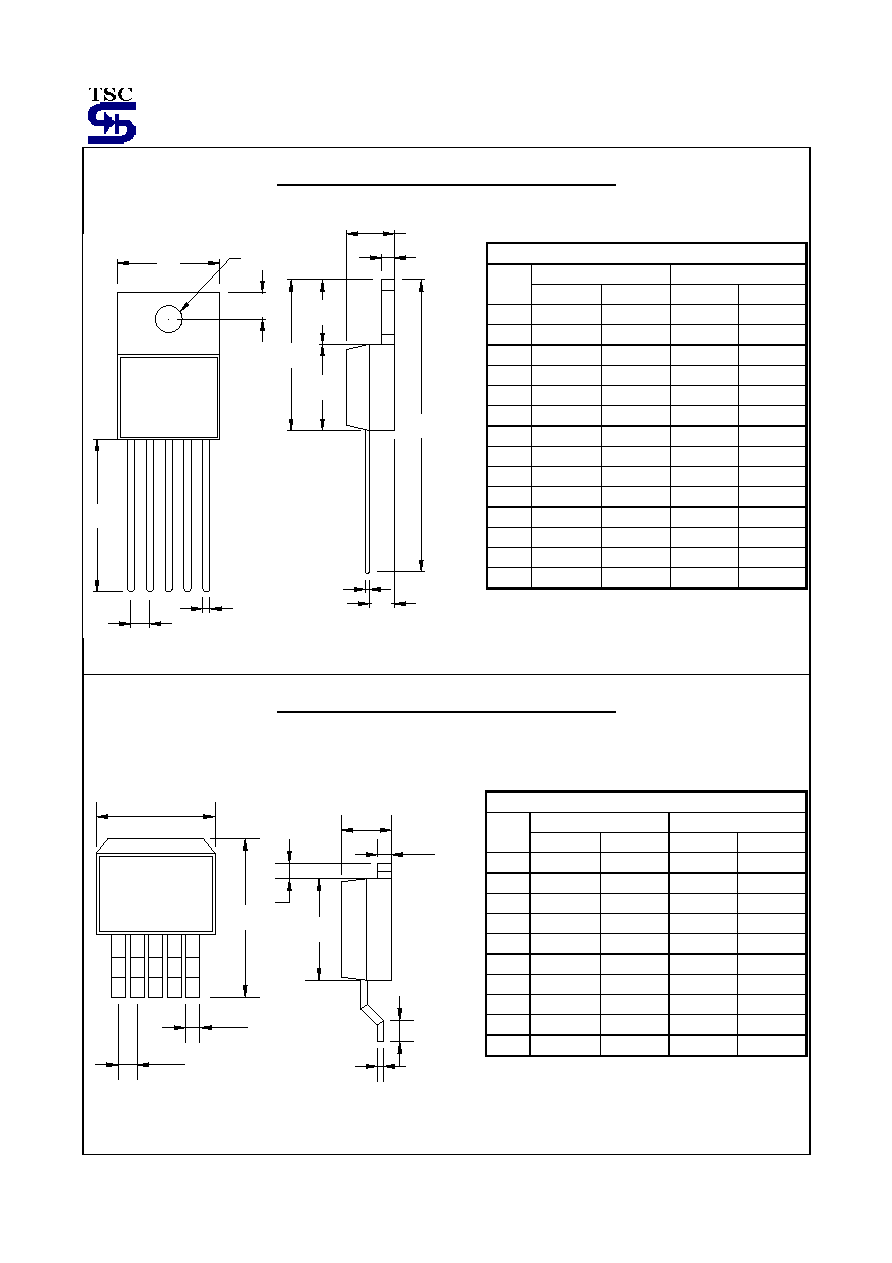
TS39151/52
1-1
2004/09 rev. A
TS39151/52
1.5A Ultra Low Dropout Positive Voltage Regulator
Low Dropout Voltage 0.4V (typ.)
Enable Input Control
Adjustable Output
Error Flag Detection
General Description
The TS39151/52 series are 1.5A ultra low dropout linear voltage regulators that provide low voltage, high current output
from an extremely small package. These regulator offers extremely low dropout (typically 400mV at 1.5A) and very low
ground current (typically 12mA at 1.5A).
The TS39151/52 series are fully protected against over current faults, reversed input polarity, reversed lead insertion,
over temperature operation, positive and negative transient voltage spikes, logic level enable control and error flag which
signals whenever the output falls out of regulation.
On the TS39151/52, the enable pin may be tied to Vin if it is not required for enable control. This series are offered in
5-pin TO-220, TO-263 package.
Features
Dropout voltage typically 0.4V @Io=1.5A
Output current up to 1.5A
Low ground current
Output voltage trimmed before assembly
Extremely fast transient response
Reversed leakage protection
Reverse battery protection
Error flag signals output out of regulation
Internal current limit
Thermal shutdown protection
Ordering Information
Note: Where
xx
denotes voltage option, available are
5.0V, 3.3V, 2.5V and 1.8V.
Part No.
Operating Temp.
(Junction)
Package
TS39151CZ5
xx
TO-220-5L
TS39151CM5
xx
TO-263-5L
TS39152CZ5 TO-220-5L
TS39152CM5
-40 ~ +125
o
C
TO-263-5L
Applications
Battery power equipment
LDO linear regulator for PC add-in cards
PowerPC
TM
power supplies
Multimedia and PC processor supplies
High efficiency linear power supplies
High efficiency post regulator for switching supply
Low-voltage microcontrollers and digital logic
SMPS post regulator
Absolute Maximum Rating
(Note 1)
Supply Voltage
Vin
-20V ~ +20
V
Enable Voltage
Ven
+20
V
Storage Temperature Range
T
STG
-65 ~ +150
o
C
Lead Soldering Temperature (260
o
C)
5
S
ESD
(Note 3)

TS39151/52
2-2
2004/09 rev. A
Operating Rating
(Note 2)
Operation Input Voltage
Vin (operate)
+2.25 ~ +16
V
Operation Enable Voltage
Ven (operate)
+2.25 ~ +16
V
Power Dissipation (Note 4)
P
D
Internally Limited
W
Operating Junction Temperature Range
T
J
-40 ~ +125
o
C
Electrical Characteristics
Vin = Vout + 1V, Venable= 2.4V, Tj = 25
o
C, unless otherwise specified.
Parameter Conditions
Min
Typ
Max
Unit
Output Voltage
I
L
=10mA 0.990|Vo|
1.010|Vo|
Output Voltage
10mA
I
L
1.5A,
Vo+1V
Vin 8V
0.980|Vo|
5.0/3.3
2.5/1.8
1.020|Vo|
V
Line Regulation
I
L
=10mA, Vo+1V
Vin 16V
--
0.05
0.5
%
Load Regulation
Vin=Vout+1V,
10mA
I
L
1.5A
-- 0.2 1.0 %
Output Voltage Temp. Coefficient
--
40
100
ppm/
o
C
Dropout Voltage (Note 5)
Vout= -1%
I
L
=100mA
I
L
=750mA
I
L
=1.5A
--
--
--
100
275
400
200
--
600
mV
Quiescent Current (Note 6)
Vin=V
out
+1V
I
L
=750mA
I
L
=1.5A
--
--
7
17
20
--
mA
Current Limited
Vout=0, Vin=Vout+1V
-- 2.0 2.5 A
Minimum Load Current
--
7
10
mA
Reference (TS39152)
Reference Voltage
0.980|Vo|
1.020|Vo|
Reference Voltage
(Note 7)
0.970|Vo|
1.24
1.030|Vo| V
Adjust Pin Bias Current
--
40
120
nA
Reference Voltage Temp. Coefficient
(Note 8)
--
20
--
ppm/
o
C
Adjust Pin Bias Current Temp.
Coefficient
-- 0.1 --
nA/
o
C
Flag Output (TS39151)
Output Leakage Current
V
OH
=16V --
--
2
uA
Output Low Voltage (Note 9)
Vin=0.9 * Vout, I
OL
=250uA -- -- 400 mV
Upper Threshold Voltage
% of Vout
--
--
99
%
Lower Threshold Voltage
% of Vout
93
--
--
%
Hysteresis
--
1
--
%
Enable Input (TS39151 / 2)
Low (OFF)
--
--
0.8
Input Logic Voltage
High (ON)
2.25
--
--
V
Ven=2.25V --
--
75
Enable Pin Input Current
Ven=0.8V --
--
4
uA

TS39151/52
3-3
2004/09 rev. A
Thermal Performance
Condition Package
type
Typ Unit
TO-220, TO-220-5L
2.0
Thermal Resistance
Junction to Case
TO-263, TO-263-5L
2.0
o
C/W
Note 1: Absolute Maximum Rating is limits beyond which damage to the device may occur. For guaranteed
specifications and test conditions see the Electrical Characteristics.
Note 2: The device is not guaranteed to operate outside its operating rating.
Note 3: Devices are ESD sensitive. Handling precautions recommended.
Note 4: The maximum allowable power dissipation is a function of the maximum junction temperature, Tj, the junction to
ambient thermal resistance, ja, and the ambient temperature, Ta. Exceeding the maximum allowable power
dissipation will cause excessive die temperature, and the regulator will go into thermal shutdown. The effective
value of ja can be reduced by using a heatsink, Pd
(max)
= (Tj
(max)
� Ta) / ja.
Note 5: Dropout voltage is defined as the input to output differential at which the output voltage drops -1% below its
nominal value measured at 1V differential.
Note 6: Ground pin current is the regulator quiescent current. The total current drawn from the source is the sum of the
ground pin current and output load current, Iin = Ignd + Iout.
Note 7: Vref
Vout (Vin � 1V), 2.25V Vin 16V, 10mA I
L
1.5A.
Note 8: Output voltage temperature coefficient is Vout (worse cast) / (Tj
(max)
- Tj
(min)
) where is Tj
(max)
+125
o
C and
Tj
(min)
is 0
o
C.
Note 9: For adjustable device and fiexed device with Vout > 2.25V.
Block Diagram
* Flag network is fixed output versions only (TS39151)
** Adjustable output version only (TS39152)

TS39151/52
4-4
2004/09 rev. A
Pin Assignment
Pin No.
TS39151 TS39152
Pin
Configuration
Pin
Description
1 1
Enable
Enable (input): TTL/COMS compatible input. Logic high is
enable; logic low or open is shutdown
2 2
Input
Unregulated input: +16V maximum supply
3 3
Ground
Ground: Ground pin and TAB/heatsink are internally
connected.
4 4
Output Regulator
output
5
Flag
Error Flag (output): Open-collector output. Active low
indicates an output fault condition.
5
Adjust
Adjustment input: Feedback input. Connect to resistive
voltage-divider network.
Typical Application Circuit
TS39151
TS39152

TS39151/52
5-5
2004/09 rev. A
Application Information
Application Information
The TS39151/52 series are high performance with low
dropout voltage regulator suitable for moderate to high
current and voltage regulator application. Its
400mV(typ) dropout voltage at full load and over
temperature makes it especially valuable in battery
power systems and as high efficiency noise filters in
post regulator applications. Unlike normal NPN
transistor design, where the base to emitter voltage
drop and collector to emitter saturation voltage limit the
minimum dropout voltage, dropout performance of the
PNP output of these devices is limited only by low Vce
saturation voltage.
The TS39151/52 series is fully protected from damage
due to fault conditions. Linear current limiting is
provided. Output current during overload conditions is
constant. Thermal shutdown the device when the die
temperature exceeds the maximum safe operating
temperature. Transient protection allows device survival
even when the input voltage spikes above and below
nominal. The output structure of these regulators allows
voltages in excess of the desired output voltage to be
applied without reverse current flow.
Capacitor Requirement
The TS39151/52 series requires an output capacitor to
maintain stability and improve transient response is
necessary. The value of this capacitor is dependent
upon the output current, lower currents allow smaller
capacitors. TS39151/52 series regulators are stable
with the 10uF minimum capacitor value at full load.
Where the regulator is powered from a source with high
AC impedance, a 0.1uF capacitor connected between
input and ground is recommended. The capacitor
should have good characteristics to above 250KHz. The
capacitance values will be help to improved transient
response, ripple rejection and output noise.
Minimum Load Current
The TS39151/52 series is specified between finite
loads. If the output current is too small leakage currents
dominate and the output voltage rises. A 10mA
minimum load current swamps any expected leakage
current across the operating temperature range.
Thermal Characteristics
TS39151/52 series linear regulators are simple to use,
the most complicated design parameters to consider
are thermal characteristics, thermal design requires the
following application specification parameters:
Maximum ambient temperature, Ta
Output current, Iout
Output voltage, Vout
Input voltage, Vin
We calculate the power dissipation of the regulator
from these numbers and the device parameters from
this data sheet. A heatsink may be required depending
on the maximum power dissipation and maximum
ambient temperature of the application. Under all
possible operating conditions, the junction temperature
must be within the range specified under absolute
maximum ratings. To determine if the heatsink is
required, the power dissipated by the regulator, P
D
must be calculated.
The below formula shows the voltages and currents for
calculating the P
D
in the regulator:
Iin = I
L
/ I
G
P
D
= (Vin-Vout) * I
L
+ (Vin) * I
G
Ex. P
D
= (3.3V-2.5V) * 0.5A + 3.3V * 11mA
= 400mW + 36mW
= 436mW
Remark: I
L
is output load current,
I
G
is ground current.
Vin is input voltage
Vout is output voltage
The next parameter which must be calculated is the
maximum allowable temperature rise, T
R
(max). this is
calculated by the using to formula:
T
R
(max) = T
J
(max) � T
A
(max)
Where: T
J
(max) is the maximum allowable junction
temperature, which is 125
o
C for commercial
grade parts.
T
A
(max) is the maximum ambient
temperature which will be encountered in the
application. Using the calculated values for T
R
(max)
and P
D
, the maximum allowable value for the junction
to ambient thermal resistance, ja, can now be found:
ja = T
R
(max) / P
D

TS39151/52
6-6
2004/09 rev. A
Application Information (continues)
Adjustable Regulator Design
The adjustable regulator versions (TS39152) is allow
to programming the output voltage anywhere between
1.25 and the 16V maximum operating rating of the
family.
Two resistors are used. Resistors can be quite large
up to 1M, because of the very high input impedance
and low bias current of the sense comparator, the
resistor values are calculated by:
R1 = R2 * [(Vout / 1.24) � 1]
Where is Vout the desired output voltage. Above
application circuit shows component definition.
Applications with widely varying load currents may
scale the resistors to draw the minimum load current
required for proper operation.
Error Flag
TS39151 versions feature an Error Flag, which looks
at the output voltage and signals an error condition
when this voltage drops 5% below its expected value.
The error flag is an open-collector output that pulls low
under fault conditions. It may sink 10mA. Low output
voltage signifies a number of possible problems,
including an over-current fault (the device is in current
limit) and low input voltage. The flag output is
inoperative during over temperature shutdown
conditions.
Enable Input
TS39151 and TS39152 versions feature an enable
(EN) input that allows ON/OFF control of the device.
Special design allows "zero" current drain when the
device is disabled�only microamperes of leakage
current flow. The EN input has TTL/CMOS compatible
thresholds for simple interfacing with logic, or may be
directly tied to 20V. Enabling the regulator requires
approximately 30uA of current.

TS39151/52
7-7
2004/09 rev. A
TO-220-5L Mechanical Drawing
TO-220 DIMENSION
MILLIMETERS INCHES
DIM
MIN MAX MIN MAX
A 10.00 10.50 0.394 0.413
B 3.240 4.440 0.128 0.175
C 2.440 2.940 0.096 0.116
D 0.260 1.020 0.010 0.040
E 1.570 1.830 0.062 0.072
F 13.31 14.13 0.524 0.556
G 4.475 5.225 0.176 0.206
H 1.170 1.370 0.046 0.054
I 27.60 29.44 1.087 1.159
J 2.175 2.925 0.086 0.115
K 0.297 0.477 0.012 0.019
L 8.280 8.800 0.326 0.346
M 6.010 6.510 0.237 0.256
N 14.29 15.31 0.563 0.603
TO-263-5L Mechanical Drawing
B
D
C
A
J
I
H
G
F
E
TO-263 DIMENSION
MILLIMETERS INCHES
DIM
MIN MAX MIN MAX
A 10.220 10.260 0.402 0.404
B 14.600 15.870 0.575 0.625
C 0.750 0.770 0.030 0.030
D 1.573 1.827 0.062 0.072
E 4.560 4.570 0.179 0.180
F 1.240 1.270 0.049 0.050
G 2.280 2.790 0.090 0.110
H 0.280 0.320 0.011 0.013
I 8.240 8.280 0.324 0.326
J 1.540 1.800 0.060 0.071
C
D
B
F
E
A
N
L
I
K
J
M
H
G






